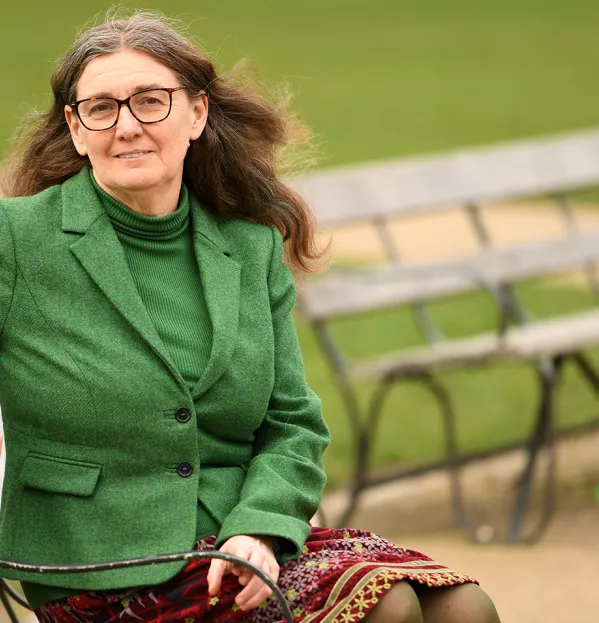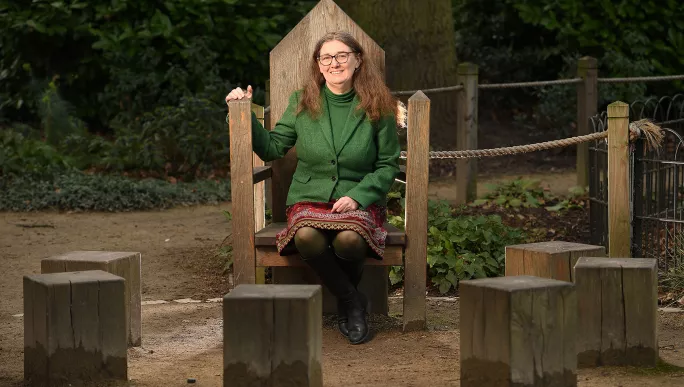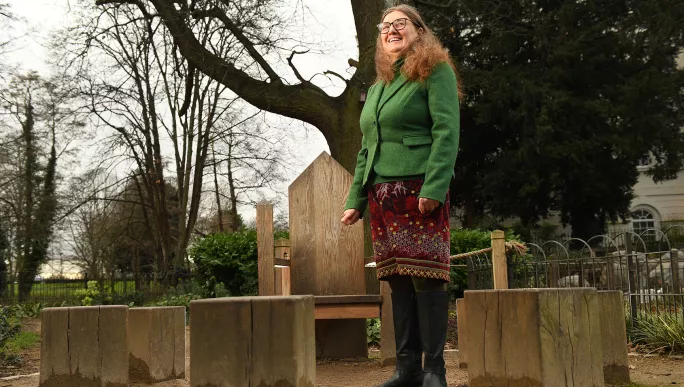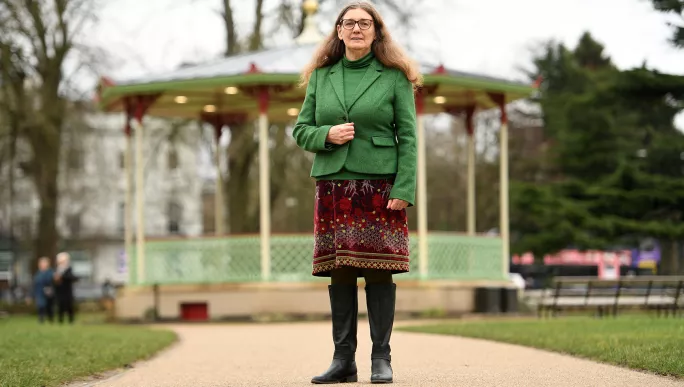- Home
- Leadership
- Staff Management
- 10 questions with... NGA chief Emma Knights
10 questions with... NGA chief Emma Knights

Emma Knights OBE is the chief executive of the National Governance Association (NGA) - a role she has held since 2010 and that sees her work to increase the effectiveness of governing boards in maintained schools and multi-academy trusts so they can serve their schools, and in turn the pupils, as best as possible.
It’s a broad remit, with her work involving everything from participating in the Department for Education’s National Headteacher Standards Review Group to its flexible working advisory group and the Ethical Leadership Commission. She has also previously sat on the Commission on Religious Education and the Knowsley Education Commission.
Here, she chats to Tes for our 10 questions series, talking about her own time in education, proudest career moments, why she believes the work of governors is so fundamental to the sector and how she thinks education will evolve in the future.
1. Who was your most memorable teacher and why?
His name was Mr Clegg and he was my chemistry teacher.
I did most of my schooling in Bermuda, so this was at my secondary school in Bermuda, and he made chemistry come alive. I really got to understand what it was about and why it was important.
As a result, I ended up doing biochemistry at university because I was good at it, but, with hindsight, I’m not sure that was the right thing for me and when I was really struggling, particularly with the physical chemistry stuff, I used to think, “Mr Clegg this is all your fault, if you hadn’t been so good at this, I would have chosen a different topic!”.
But with the distance of no longer having to grapple with physical chemistry, I think it was no bad thing because, although I’ve ended up working mainly in social policy, having that analytical background and being very data-based was a really good education for me.
2. What were the best and worst things about your time at school?
The worst thing was being made to learn the violin for four years simply because I was good at maths. I passed the music theory test that got you into the music stream and I’m appalling at music so I had to sit through four hours of violin and orchestra a week, which was such a terrible waste of my time.

Also, the standards of girls’ PE was very high in Bermuda - I realised this after we moved back to Britain - and it is an excruciating thing when you’re the last to be picked for teams.
But on the good side, the people in Bermuda - and when I got back to Liverpool - were very welcoming. I could have been an obvious target for bullying; I had an English accent, I had lots of red hair that stuck out a mile in Bermuda, and I was quite little and clever but I never ever [felt bullied] and people were very welcoming
I ended up leaving [Bermuda] halfway through the fifth form at the end of the year and they did a yearbook after I’d left but they filled it all in and wrote comments and sent it to me - it was such a nice thing to do…I can feel myself welling up now talking about it.
3. Why do you work in education?
Because I became a parent. Before having children my jobs were not in education, they were in community work, advice work, child poverty projects.
But then I worked part-time when my kids were young and I was one of those parents that came in and helped with reading and I helped on the school swimming lessons once a week, which was great fun.
But then when they moved up to middle school, I found the school didn’t have an after school club, which was pretty devastating. So I spent two years of my life setting up an after school club, which was my first real engagement with how schools work and who has the influence - the caretaker had a huge amount!
That work was then partly responsible for my first chief executive job at an organisation that, at the time, was called the Daycare Trust and worked on early years childcare and, what was then called, the Extended School programme - extracurricular activities, clubs and so on.
Then I became a governor at my children’s secondary school and that was before I knew NGA existed again but I got involved because I wanted to make a difference contribute to the school as a whole.
4. What are you proudest of in your career? And what do you regret?
One is simply growing NGA in order to be able to serve governors and trustees better.
It was a very small organisation when I joined in 2010 but, over that period, it’s grown beyond recognition and we now offer all sorts of things, such as developing our own e-learning to help serve governors.
Also in 2016, we had a minor rebrand from National Governors’ Association to the National Governance Association - which, as well as being great to get rid of the apostrophe, the four-letter change, I hope, signalled that NGA is there to improve governance whether you are a governor, an academy trustee, a governance professional or a leader working with boards.

I am really proud that, given all the changes in governance structures over the past decade (especially with the growth of multi-academy trusts), NGA’s staff and freelance consultants have been at the cutting edge of practice in trust governance, providing a huge range of resources for trustees.
Regrets...it’s not a regret so much, but I had one year where I thought, “What have you done?” I was working for Citizens Advice, and we had to prove we were value for money.
So I ended up running a project, which was about performance measurement, and I just thought, “This is not what I want to do with my life”.
But actually, in every single job since, it’s been really useful that I know that stuff because it comes up time and time again about what’s reasonable accountability, what should you measure, the whole point about the tyranny of numbers and so on.
I couldn’t possibly have done it for more than that. 12 months, I would have gone mad. But again, I learned things that, with the benefit of hindsight, was really useful knowledge.
5. Who would be your colleagues and your perfect school staff room?
I think it’s about laughter and chat, as that’s really important to me as I get my energy from other people, and having those other little conversations that are about their whole lives and not just about the matter at hand.
6. What are the best and worst aspects of our school system?
I think one of the worst aspects is how we narrow down what we’re valuing at quite an early age and we get onto the tramline too soon about attainment.
But actually, whole-person development is something we need to be thinking about but we haven’t got the system calibrated properly in terms of what do we want our young people to leave our schools being, doing and believing.
But, while it may not be the “best” thing, on the flip side, I think we are beginning to have proper debates about this now, whereas in the past I think education was quite hierarchical and deferential.
This means people didn’t always feel comfortable putting their view across but I think the sector has got an awful lot better and people are being more evidence-based and there is more discussion of the research we should be using in order to inform our practice.
7. If you became education secretary tomorrow, what would do?
The first thing I want to do would be to think more about early years and invest more in early years. I think it has far less status than when you’re higher up the age range but it’s so important, particularly for tackling the disadvantaged gap.
8. What will our schools be like in 30 years’ time?
If you look backwards, a lot hasn’t changed in education over the last 100 years or so, say compared to say health, where you can go to museums and see how it used to be. But a classroom in a museum wouldn’t look that different from the classrooms now.
But I think education will have changed a lot more in the next 30 years than the last 100 because of technology and because the pandemic has changed our view about what is possible and the potential of doing things differently.

I wouldn’t like to predict exactly what that would be in 30 years’ time, but I imagine that we may have moved away from the sort of provision we have now
9. Who has made the biggest difference to education in the last 12 months?
It absolutely has to be school leaders - we were getting that back from governing boards all the time about just how much in awe they were of school leaders who stepped up during the pandemic.
The other reason I say school leaders is because they often had to look out for everybody else during the pandemic. They’ve had to look out for staff - from those still coming into school to those shielding, they’ve had to keep pupils safe and engage with parents.
I think we’ve seen relations with the parent body improve over this period - in spite of how difficult it has been at the time, with some saying, “You’re damaging my child making them wear a mask”, and others saying, “They’re at risk being in a room with 30 other children”.
It’s been a really tough gig and it’s been said a lot over the last year, but I think it bears repeating.
I would also like to add a little shout for school business leaders too because they don’t usually get quite as much kudos but, with all the work that’s been done on premises in particular over the last couple of years, it’s been absolutely essential to getting this right.
And I know it’s completely not sexy to talk about budgets, but schools and trusts are getting better and better at financial efficiencies and doing that well, and not as cuts but managing resource. I think the school business world is really coming into its own now.
10. What are the most important lessons you’ve learned from doing this job?
The people that engage with NGA, who volunteer, have such a range of skills and knowledge and commitment.
In 2018, Damian Hinds was leaving our conference after he’d just been really pushed on funding by our members, I asked him what his reaction was and he said to me, “They’re good people doing good things”. That really stuck with me as a nice way of putting it.
And that is reinforced to me all the time. For example, we’ve just been running a series of events on environmental sustainability and this has been led either by staff and leaders who are passionate about the climate, or by governors and trustees who are passionate about the climate, and they’ve been bringing so much knowledge and enthusiasm to that.
I think, across the sector, there isn’t necessarily enough of an understanding of just what people do bring to the table and people often make glib comments about governors, “Oh they’re just amateurs”, or “They’re laypeople what do they know”.
Now, of course, people will say, “Well you’re NGA, you’re bound to say this”, but we know actually from talking to people that, day in, day out, people volunteer because they care and they want to make a difference.
Emma Knights was talking to Dan Worth
You need a Tes subscription to read this article
Subscribe now to read this article and get other subscriber-only content:
- Unlimited access to all Tes magazine content
- Exclusive subscriber-only stories
- Award-winning email newsletters
Already a subscriber? Log in
You need a subscription to read this article
Subscribe now to read this article and get other subscriber-only content, including:
- Unlimited access to all Tes magazine content
- Exclusive subscriber-only stories
- Award-winning email newsletters



